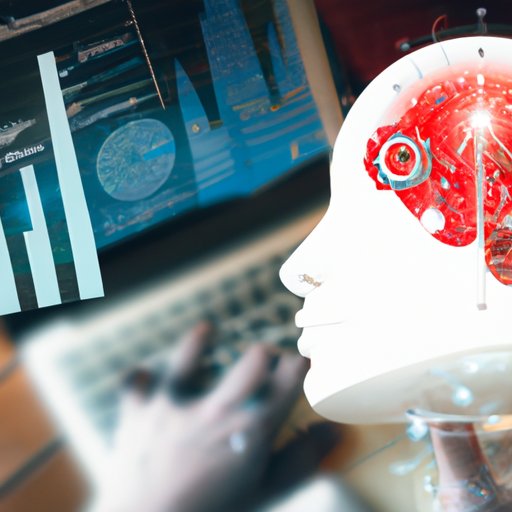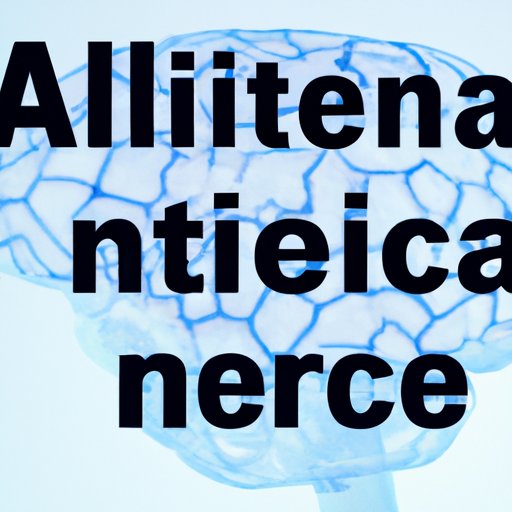Introduction
Artificial Intelligence (AI) is an area of computer science that focuses on creating machines that can think and act like humans. AI has become increasingly popular over the past few years due to its potential to revolutionize various industries. From healthcare to education, AI has the potential to improve efficiency and accuracy in a variety of fields. This article will explore the various advantages of AI and how it is impacting different sectors of society.

Examining the Impact of AI on Business Productivity
AI has the potential to significantly improve business productivity. According to research conducted by the consulting firm Accenture, “AI could double annual economic growth rates by 2035, boosting labor productivity by up to 40%.” With AI-driven automation, businesses can streamline their processes, reducing the amount of time and money spent on mundane tasks. AI can also help businesses better understand their customers and provide more personalized services.
AI technology can help businesses improve efficiency in a variety of ways. AI-powered chatbots can handle customer inquiries quickly and accurately. This eliminates the need for businesses to hire additional customer service staff, saving them time and money. AI-driven analytics can also be used to identify potential areas of improvement within a business. By analyzing data, businesses can uncover patterns and trends that can be used to improve their operations.
AI can also be used to enhance customer service. AI-driven algorithms can be used to analyze customer data and generate insights into their preferences and behaviors. This allows businesses to create more tailored experiences for their customers, resulting in improved customer satisfaction. AI-enabled robots can also be used to automate mundane tasks, freeing up employees to focus on more important tasks.
Exploring AI-Driven Automation and Its Benefits
One of the most significant advantages of AI-driven automation is the ability to reduce operational costs. Automated processes are more efficient and require less human intervention, resulting in lower overhead costs. AI-powered bots can also be used to monitor and manage inventory, which can help businesses reduce costs associated with ordering and stocking products.
AI-driven automation also offers increased accuracy compared to manual processes. AI-powered robots and algorithms can complete complex tasks with greater precision and accuracy than humans. This can help reduce errors and increase the quality of products or services. In addition, AI-driven automation can help streamline processes, making it easier for businesses to complete tasks quickly and efficiently.
AI’s Role in Enhancing Human Intelligence
AI can be used to augment human intelligence, helping us make better decisions and solve problems more effectively. AI-powered algorithms can be used to analyze large amounts of data and generate insights that would otherwise be too complex for humans to process. This can help inform decision making and provide valuable insights into potential solutions. AI-powered robots can also be used to automate tedious tasks, allowing humans to focus on more creative endeavors.
AI can also be used to improve problem solving abilities. AI-driven algorithms can be used to identify patterns and uncover hidden relationships between data points. This can help humans better understand complex problems and formulate effective solutions. AI-powered robots can also be used to automate mundane tasks, freeing up humans to focus on more creative endeavors.
AI can also be used to create personalized learning experiences. AI-driven algorithms can be used to identify patterns in student behavior and generate insights into their learning styles. This can help teachers tailor instruction to individual student needs, resulting in improved performance. AI-powered robots can also be used to automate grading and assessment processes, allowing teachers to spend more time focusing on teaching.

Artificial Intelligence and Its Role in Healthcare
AI has the potential to revolutionize healthcare. AI-driven algorithms can be used to analyze medical data and generate insights into patient health. This can help doctors identify diseases earlier and provide more accurate diagnoses. AI-powered robots can also be used to automate mundane tasks such as drug delivery, freeing up healthcare professionals to focus on more important tasks.
AI can also be used to improve data analysis. AI-driven algorithms can be used to identify patterns in medical data and generate insights into patient health. This can help healthcare professionals better understand diseases and provide more effective treatments. AI-powered robots can also be used to automate mundane tasks such as drug delivery, freeing up healthcare professionals to focus on more important tasks.
AI also has the potential to enhance treatment options. AI-powered algorithms can be used to identify potential treatments and generate insights into their effectiveness. This can help doctors select the best course of action for their patients. AI-powered robots can also be used to automate mundane tasks such as drug delivery, freeing up healthcare professionals to focus on more important tasks.
How AI is Transforming the Education System
AI has the potential to revolutionize education. AI-driven algorithms can be used to analyze student performance data and generate insights into their learning styles. This can help teachers tailor instruction to individual student needs, resulting in improved performance. AI-powered robots can also be used to automate grading and assessment processes, allowing teachers to spend more time focusing on teaching.
AI can also be used to create personalized learning experiences. AI-driven algorithms can be used to identify patterns in student behavior and generate insights into their learning styles. This can help teachers tailor instruction to individual student needs, resulting in improved performance. AI-powered robots can also be used to automate grading and assessment processes, allowing teachers to spend more time focusing on teaching.
AI-driven analytics can also be used to identify potential areas of improvement within the education system. By analyzing data, educators can uncover patterns and trends that can be used to improve the quality of instruction. AI-powered robots can also be used to automate mundane tasks such as grading and assessment, freeing up educators to focus on more important tasks.

AI as a Tool for Better Decision Making
AI can be used to improve decision making. AI-driven algorithms can be used to analyze large amounts of data and generate insights that would otherwise be too complex for humans to process. This can help inform decision making and provide valuable insights into potential solutions. AI-powered robots can also be used to automate mundane tasks, freeing up humans to focus on more creative endeavors.
AI can also be used to improve predictive analytics. AI-driven algorithms can be used to identify patterns in data and generate insights into future outcomes. This can help businesses plan for the future and make more informed decisions. AI-powered robots can also be used to automate mundane tasks, freeing up humans to focus on more creative endeavors.
AI can also be used to speed up the processing of data. AI-driven algorithms can be used to analyze large amounts of data quickly and accurately. This can help businesses make decisions faster and more efficiently. AI-powered robots can also be used to automate mundane tasks, freeing up humans to focus on more creative endeavors.
The Potential of AI in Smart Manufacturing
AI has the potential to revolutionize manufacturing. AI-driven algorithms can be used to analyze production data and generate insights into potential areas of improvement. This can help manufacturers optimize their processes and improve the quality of their products. AI-powered robots can also be used to automate production lines, freeing up workers to focus on more important tasks.
AI can also be used to improve quality control. AI-driven algorithms can be used to identify defects in products and generate insights into potential solutions. This can help manufacturers reduce costs associated with defective products. AI-powered robots can also be used to automate quality control processes, freeing up workers to focus on more important tasks.
AI can also be used to enhance supply chain management. AI-driven algorithms can be used to analyze data and generate insights into potential areas of improvement. This can help manufacturers optimize their supply chains and reduce costs associated with inventory management. AI-powered robots can also be used to automate supply chain processes, freeing up workers to focus on more important tasks.
Conclusion
In conclusion, AI has the potential to revolutionize a variety of industries. From business productivity to healthcare and education, AI-driven automation can offer numerous advantages. AI can help businesses reduce operational costs, improve customer service and increase efficiency. It can also be used to enhance human intelligence and create personalized learning experiences. Finally, AI can be used to improve decision making, predictive analytics and supply chain management.
The advantages of AI are clear, and its potential applications are seemingly endless. As AI technology continues to develop, it will continue to revolutionize various industries. Its potential to improve efficiency, accuracy and productivity is undeniable, and its impact on society is sure to be immense.
(Note: Is this article not meeting your expectations? Do you have knowledge or insights to share? Unlock new opportunities and expand your reach by joining our authors team. Click Registration to join us and share your expertise with our readers.)
